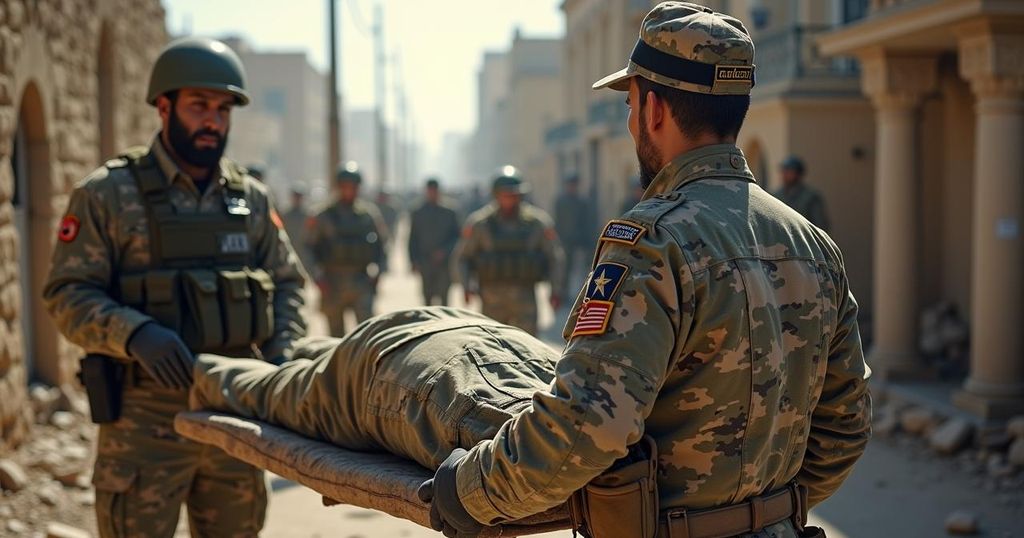Iran’s IRGC has recovered the body of General Abbas Nilforoushan, killed in a recent Israeli airstrike alongside Hezbollah leader Hassan Nasrallah in Beirut. The circumstances surrounding their deaths have sparked investigations into security breaches and possible infiltration by Israeli forces. Concerns grow regarding the absence of Quds Force commander Esmail Qaani amid the escalating tensions and retaliatory attacks between Iran and Israel.
Iran’s Islamic Revolutionary Guard Corps (IRGC) has announced the recovery of the body of Brigadier General Abbas Nilforoushan, a senior Quds Force general, following a significant Israeli airstrike in Beirut last month. General Nilforoushan was reportedly in Lebanon to meet Hezbollah leader Hassan Nasrallah on the evening of the strike, which occurred on September 27 and targeted Hezbollah’s operations facility in the southern suburbs of the city. In a statement released late Friday and covered by Iranian media, the IRGC declared, “With hard work and efforts around the clock, the body of martyr Abbas Nilforoushan has been discovered. The time of transferring the body of martyr Nilforoushan to the Islamic homeland and the funeral and burial plans will be announced later.” Speculation continues regarding the whereabouts of Esmail Qaani, the Quds Force commander, who has not made a public appearance since before the deaths of Nilforoushan and Nasrallah. Reports suggest that Qaani was in Beirut during a subsequent Israeli airstrike on October 4, which likely killed Nasrallah’s presumed successor, Hashem Safieddine. Amid speculation about his safety, Middle East Eye has confirmed his survival but noted that he is currently under guard as part of an Iranian investigation focusing on potential security breaches that allowed Israel to successfully target senior figures. An advisor to the IRGC remarked that Qaani “is in perfect health” and is expected to receive an award from Iranian Supreme Leader Ali Khamenei soon. The ongoing investigations into the circumstances surrounding both Nilforoushan’s and Nasrallah’s deaths are revealing suspicions within Iran regarding possible infiltration by Israeli intelligence into the IRGC. Reports indicate that Nilforoushan arrived in Beirut on the same night of the strike and was transported directly to the fortified operations room in Haret Hreik, arriving before Nasrallah, with the strike occurring shortly after Nasrallah’s arrival. Iran remains vigilant after recently launching an attack against Israel, firing approximately 200 ballistic missiles in retaliation for the deaths of key figures and the ongoing conflict involving Israel in Gaza. Israel has responded with threats of subsequent military action, asserting its future strikes would be “lethal, precise and above all, surprising.” General Nilforoushan had been overseeing operations in Syria and Lebanon since his predecessor’s death in an Israeli strike in Damascus earlier this year. Qaani, age 67, took command of the Quds Force in January 2020 following the assassination of Qassem Soleimani by a U.S. drone strike.
The article details the recent recovery of the body of Brigadier General Abbas Nilforoushan, a Quds Force general, following an Israeli airstrike that targeted Hezbollah leadership in Beirut. Nilforoushan was killed while meeting with Hezbollah’s leader Hassan Nasrallah and is central to discussions about Iranian military operations in the region. The situation is compounded by concerns over the leadership of the Quds Force and potential Israeli infiltration of Iranian security measures. The implications of these events are underscored by the heightened tensions in the region, particularly regarding Israel and Iran’s mutual hostilities.
In summary, the recovery of General Abbas Nilforoushan’s body signifies a critical development for Iran amid heightened tensions with Israel. The investigation into the circumstances of the airstrike that killed him and Hassan Nasrallah reflects broader concerns regarding security vulnerabilities within Iranian military operations. The absence of Quds Force head Esmail Qaani from public view further complicates the situation, as accusations of Israeli intelligence successes loom large over Iran’s military planning and operational security. Iran’s ongoing retaliatory measures and Israel’s responses set the stage for possible future escalations in the conflict.
Original Source: www.middleeasteye.net






